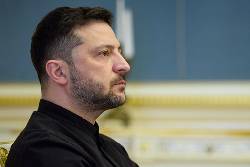KYIV, Ukraine (AP) — Ukrainian President Volodymyr Zelenskyy faces a crucial week of diplomacy, testing his abilities to stand his ground while demonstrating to the United States that he is willing to compromise.
Since a draft of a 28-point U.S.-Russia brokered peace plan was leaked to the press on Thursday, Ukraine and its European allies have been trying to buy time and ensure their interests are represented in any deal. The draft has triggered alarm in Kyiv and European capitals for favoring Russian demands and goals. It includes points on limiting the size of Ukraine’s army as well as handing over Ukrainian territory that Russia has occupied, and Kyiv relinquishing any justice for the thousands of recorded alleged war crimes committed by Moscow. The dial appeared to swing back somewhat more favorably for Kyiv after a U.S. and Ukrainian delegation met in Geneva on Sunday. Both sides said discussions were “productive” and would continue. Zelenskyy said he felt Trump was “hearing” Ukraine in a statement late Sunday after the Geneva talks ended. All this is playing out as Zelenskyy tries to stem public anger from a major corruption scandal and Russia makes slow but steady advances across parts of the 1,000-kilometer (620-mile) front line and relentlessly bombs Ukraine’s power plants, causing severe electricity shortages as colder weather sets in. Here are some things to know about the growing pressures confronting Zelenskyy.
Ukraine and Europe politely push back
After the plan was leaked, U.S. President Donald Trump set a hard deadline for Kyiv to sign on to it before Thanksgiving, jolting Ukraine and Europe. Ukraine and European leaders made a series of statements, stressing how grateful they are to Trump for his efforts to end the war while stating the need to ensure Kyiv has input into any deal. In a joint statement on Friday, European leaders, together with British Prime Minister Keir Starmer, said they welcomed the plan, saying it contained “important elements” and could be used as “a basis that will require additional work.” The U.S. and Ukraine dispatched delegations to Geneva with the aim of hashing out an agreement on Sunday. Speaking after the Geneva talks, U.S. Secretary of State Marco Rubio appeared to roll back on the hard deadline, saying that “more time is needed.”
The U.S. and Ukraine said the talks were “productive” but neither side shared details of the issues still unresolved. “It is important that European partners support our positions and our people,” Zelenskyy said on Monday, emphasizing his reliance on European support in the face of U.S. pressure and at times open hostility from Trump, who claimed Sunday that Zelenskyy showed “zero gratitude” for U.S. support.
Peace talks distract from Zelenskyy's domestic woes
Zelenskyy sent his beleaguered presidential chief of staff, Andrii Yermak, to Geneva for talks with Rubio on Sunday, glossing over intense pressure to fire him.
Zelenskyy faced an unprecedented rebellion from his own lawmakers last week after investigators revealed a $100 million corruption scandal involving top Ukrainian officials.
Although Yermak was not accused of any wrongdoing, several senior lawmakers in Zelenskyy's party said Yermak should take responsibility for the debacle to restore public trust. Some said that if Zelenskyy didn't fire him, the party could split, threatening the president's parliamentary majority. But Zelenskyy resisted, saying Yermak was key to the negotiation process, according to a leading party lawmaker, who spoke on condition of anonymity because he was not authorized to discuss the issue publicly. On Friday, Zelenskyy urged Ukrainians to unite and “stop the political games” in light of the U.S. pressure.
“All of us together must not forget or confuse who exactly is the enemy of Ukraine today,” Zelenskyy said in an address to the nation.
Zelenskyy is not under imminent threat
Despite the recent week of unprecedented criticism, including rebellion from within his own party, Zelenskyy's own position has not come under fire. Even if Zelenskyy’s grip on parliament weakens and his popularity plummets, it would be nearly impossible to legally unseat him while the war is still going on — unless he voluntarily resigns. Russia's invasion triggered martial law in Ukraine, indefinitely postponing presidential and parliamentary elections.
Ukraine’s presidential term is normally five years and before the war the next elections had been scheduled for the spring of 2024.
But Zelenskyy will need support from parliament to push through any peace deal and questions about Yermak could resurface. And if he were to seek reelection after the war, his chances could be hurt if Yermak is still in the picture, political analysts say.
Pressure on the front and across the country
Against this backdrop, Russia’s better equipped army has scaled up attacks along the front line and against energy facilities in the rear, putting further strain on Ukraine.
The Russian army continues to steadily advance in multiple areas. Russian forces are pushing into the towns of Kupiansk and Pokrovsk, where the fiercest battles rage.
Russian attacks on Ukraine’s power plants in November have resulted in some of the worst electricity shortages since the war began. Meanwhile, after Russia destroyed much of Ukraine's gas extraction capabilities in two mass attacks this year, its state gas company, Naftogaz, has had to raise emergency funds to import expensive gas.
...


 Copyright © 1996 - 2025 CoreComm Internet Services, Inc. All Rights Reserved. | View our
Copyright © 1996 - 2025 CoreComm Internet Services, Inc. All Rights Reserved. | View our